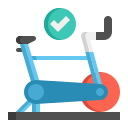AI-Powered Fitness Coaching: Revolutionizing Personal Training
AI-powered fitness coaching is redefining the landscape of personal training by harnessing advanced technology to create customized, efficient, and highly adaptive fitness journeys. With the integration of artificial intelligence, individuals now have access to smart coaching solutions that learn, evolve, and respond to unique user needs. This revolution blends data-driven insights with human-like support, transforming the way we approach our health and wellness goals. From tailored workout plans to real-time feedback, AI personal trainers are making fitness more accessible and effective for everyone, regardless of experience or lifestyle.

Previous slide
Next slide

Dynamic Workout Adjustments
Unlike static fitness plans, AI-powered systems automatically adjust workouts in real-time based on user feedback, performance metrics, or even physical indicators like heart rate and fatigue levels. These adaptive modifications mean exercises can be intensified, modified, or dialed back to match the user’s state on any given day. The ability to precisely tailor workout intensity and duration significantly boosts engagement and reduces the risk of plateau or burnout.

Nutrition Planning Tailored for You
AI’s reach extends beyond workouts into nutrition, crafting meal plans that complement each user’s exercise regime, body composition, and health goals. By assessing dietary habits, preferences, allergies, and even genetic information, AI develops eating plans scientifically aligned with desired outcomes, such as weight loss, muscle gain, or metabolic health. This degree of personalization provides ongoing dietary guidance, automatically updating recommendations as users progress.

Monitoring Progress with Precision
Continuous monitoring is a hallmark of AI-powered coaching. Sensors and wearable devices feed data to the AI, allowing it to track everything from calories burned to sleep quality and recovery. Detailed insights are provided in clear reports, helping users see tangible proof of progress or areas needing improvement. With this precision in tracking, clients learn to trust the process and stay motivated by understanding the full scope of their achievements.
Real-Time Feedback and Motivation
Through computer vision and sensor technologies, AI coaches can assess user movements in real-time, spotting improper form and providing corrective advice on the spot. This immediate feedback minimizes the risk of injury and ingrains healthy, effective movement patterns from the outset. Over time, consistent cues from the AI help users develop muscle memory, reducing reliance on constant supervision while maintaining safety and effectiveness.

Lowering the Cost of Personalized Training
Historically, engaging a personal trainer was often out of reach for many due to high hourly rates. AI fitness coaching offers expert-level guidance at a fraction of the price, with subscription models or one-time purchases making it far more affordable. This cost reduction doesn’t compromise quality; instead, it opens the door for more individuals to access professional coaching, making quality fitness support a realistic goal for all.
Overcoming Geographic and Physical Limitations
Living far from gyms or trainers no longer restricts individuals seeking fitness support, as AI-powered platforms carry expert coaching into homes, parks, or wherever a workout can happen. For those with physical disabilities or chronic health concerns, these systems adapt routines to accommodate unique needs. By creating inclusive programs, AI brings fitness opportunities to people who previously faced logistical or physical barriers.
Cultural Sensitivity and Personal Preferences
AI technologies can be programmed to incorporate culturally specific fitness and dietary practices, ensuring that coaching feels personally relevant. Language preferences, cultural celebrations, and religious observations can all be factored into a customized plan. By respecting these personal tastes and habits, AI fosters greater engagement and trust, making fitness coaching resonate across diverse populations.
The Technology Behind AI Fitness Coaches
Machine learning forms the backbone of AI coaching, enabling the system to study user data and predict future needs or challenges. As the AI collects information from each workout, meal, or sleep pattern, it draws connections between behaviors and outcomes. This allows the system to preempt plateaus, recommend new challenges, or recognize when a user is at risk of overtraining, ensuring progress stays on track and adaptation comes exactly when needed.

Future Trends in AI Fitness Coaching
Future AI trainers are expected to expand their focus beyond physical health, incorporating mental wellness, stress management, and sleep optimization into their coaching frameworks. By analyzing mood data, sleep quality, and psychological feedback, these systems will deliver truly holistic wellness advice. This comprehensive approach recognizes the interplay between mind and body, supporting users in leading balanced and fulfilling lives.
Previous
Next
Privacy, Security, and Ethical Considerations
Users entrust AI systems with sensitive health and fitness information, making robust cybersecurity protocols non-negotiable. Encryption, anonymization, and stringent access controls must be standard practice. Regular audits and transparency into data usage further build user confidence, allowing individuals to benefit from AI features without sacrificing their privacy or security.
As AI decisions increasingly influence health behaviors, it’s essential that their recommendations are based on sound science and devoid of harmful bias. Developers have a responsibility to program algorithms that respect individual autonomy, avoid reinforcing stereotypes, and prioritize evidence-based outcomes. Transparent disclosure of how recommendations are generated helps users make informed choices.
Empowering users to control their data and participate in the design of their fitness journey is a key ethical imperative. Users should have clear, simple access to privacy settings and the ability to opt in or out of data collection practices. Providing comprehensive explanations of what data is collected and how it’s used reinforces informed consent, fostering a sense of ownership over one’s health information.
